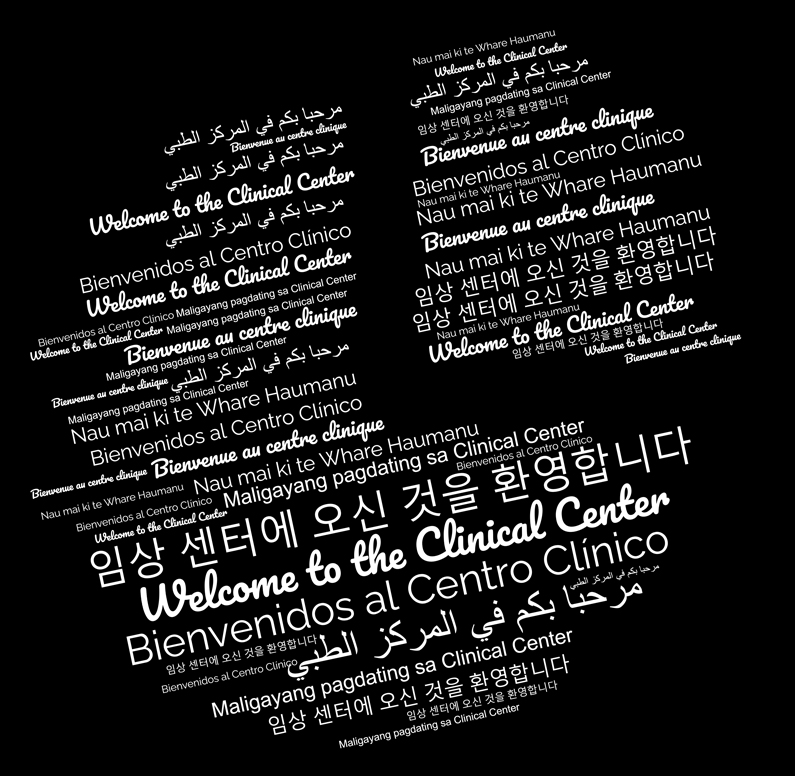Meeting the language needs of patients
In-person, remote and written translations facilitate communication

"සායනික මධ්යස්ථානය වෙත සාදරයෙන් පිළිගනිමු" would elicit a raised eyebrow from most people, but for some Clinical Center patients, they are welcome words after a long trip to Bethesda, Md. The phrase is in Sinhala, one of the two official languages of Sri Lanka, and it roughly translates as "Welcome to the Clinical Center."
According to the Centers for Medicare & Medicaid Services, more than 25 million people in the United States have limited English proficiency (LEP). These limits can make it more difficult to seek treatment in the medical system and language barriers have been associated with lower quality of care, poor clinical outcomes, longer hospital stays and higher rates of hospital readmissions.
To help avoid those negative outcomes and provide safe and patient-centered care, the Clinical Center provides access to in-person language interpretation, remote interpretation and translated written materials. These resources are provided to patients regardless of whether they are onsite, participating in a virtual telehealth appointment or talking to a member of the Clinical Center's staff over the phone.
The Language Interpreters Program is a part of the Social Work Department and is focused on providing professional medical interpreters to ensure quality, precision, and accuracy of interpreting. The services are provided at no cost for patients with LEP and can be requested in CRIS (the medical documentation system at the Clinical Center) with a minimum of 24 hours' notice. The Clinical Center also hosts a cross-departmental Language Access Committee to asses how it serves patients and visitors with limited English proficiency.
In March of 2020, the Language Interpreters Program transitioned most of its services to a virtual telehealth model and re-deployed its five full time equivalent Spanish Certified Medical Interpreters to meet demand both virtually and onsite. Telephone and local interpreter contracts also supplement services.
Onsite services have continued for high risk procedures, emergency situations and complicated informed consent encounters. The demand for robust linguistic services continually grows and evolves as does the program.
"Meeting the linguistic and cultural needs of our LEP patients is a matter of patient safety, commitment to the participation of diverse populations in research and represents a core value of the Language Interpreters Program," said Brenda J. Robles, a Certified Medical Interpreter and Manager of the Language Interpreters Program at the NIH Clinical Center.
While separate from language interpretation, the hospital also provides sign language interpretation for the hearing impaired through the Office of Research Services as another feature of its approach to patient centered care.
In 2021, Spanish accounted for 80% of the oral linguistic services provided by the hospital and 98% of the translation requests for written patient education materials.
Language requests are tied to the language needs of patients enrolled in studies that treat patients in the Clinical Center. That can mean changes on a year to year basis depending on where patients may be coming from.
In 2021, two languages made it onto the most requested list for the first time: Sinhala and Dari, variety of Persian spoken in Afghanistan. In previous years Hebrew, Portuguese, Mongolian and Amharic have been in demand.
While there's no way to predict which languages will be in demand from year to year, the Clinical Center is committed to capturing data trends to prepare for and to serve its patients with unmatched medical care, cutting-edge research and a commitment to understanding and communicating with all who walk through its doors.
Top language requests for 2021
Spanish
Arabic
Sinhala
Urdu
Mandarin
Russian
Korean
French
Portuguese
Dari
Amharic
Top language requests for 2020
Spanish
Arabic
Mandarin
Turkish
Russian
Mongolian
French
Portuguese
Vietnamese
Korean
Amharic
Top language requests for 2019
Spanish
Arabic
Mongolian
Russian
French
Mandarin
Amharic
Vietnamese
Korean
Turkish
Hebrew
- Donovan Kuehn